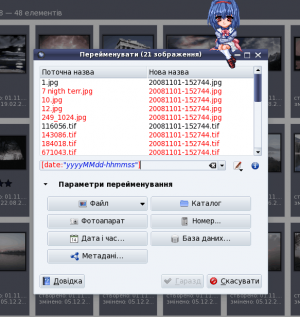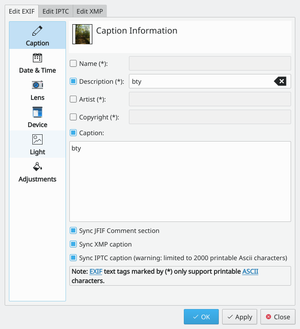digiKam/Перейменування фотографій
Перейменування фотографій за допомогою digiKam
Оригінальну версію цієї статті можна знайти у блозі Scribbles and Snaps. Статтю відтворено з дозволу Дмітрія Попова.
Надання файлам фотографій змістовних назв значно полегшує керування ними. Звичайно ж, перейменування безлічі окремих фотографій вручну дуже марудна справа, особливо, якщо ви робите десятки або сотні знімків кожного дня. Для пакетного перейменування ви можете скористатися доволі зручною можливістю digiKam. Ви можете визначити доволі складні правила перейменування і застосувати їх для перейменування багатьох фотографій натисканням однієї кнопки.

Щоб скористатися інструментом позначте пункт фотографій, які ви бажаєте перейменувати, і натисніть кнопку на головній панелі інструментів програми (ви також можете скористатися пунктом меню або натисканням клавіші F2). У діалоговому вікні ви знайдете багато параметрів, за допомогою яких можна створити складні правила перейменування. Але почати можна з простого правила, за яким назви обиратимуться на основі даних щодо дати і час створення фотографії. Щоб скористатися таким правилом, натисніть кнопку і виберіть зі спадного списку . Таким чином, буде використано дані щодо дати і часу з метаданих фотографії.
Next, you have to specify a date/time format by selecting the appropriate item from the drop-down list. If none of the available formatting options satisfy you, select the item, which lets you construct the formatting string manually. For example, the
yyyyMMdd-hhmmss
formatting string produces file names like
20100531-173501
and
20100701-110111
while the
MMM-dd-yyyy-dddd
string generates names like
May-31-2010-Monday
and
June-01-2010-Tuesday
The clever part is that you can immediately see the result of the renaming string right below the field. For a full list of available formatting options, check the official Qt documentation.
Besides date and time, the dialog window offers a few other useful options. The button, for example, allows you to add the camera model to the file name. This can be useful if you are using several cameras and you want to quickly identify photos taken with a specific camera. The button gives you access to EXIF and other photo metadata you can use in renaming rules.

Next to the field where you enter the renaming rule, there is a button that lets you specify so-called modifiers or actions that will be applied to the file names during the renaming operation. For example, using the modifiers, you can convert all file names to lower or uppercase, or capitalize the first letter. Here is a quick overview of other useful modifiers:
– Removes leading, trailing, and extra spaces. – Adds unique numerical values to identical file names. – Performs search and replace. The modifier supports regular expressions. – Lets you specify a specific fragment of the file name for the renaming rule. For example, the {5-} modifier in the [file]{5-} rule removes the first four characters of the file name, so IMAG0113.jpg, IMAG0351.jpg, and IMAG0573.jpg are renamed to 0113.jpg, 0351.jpg, and 0573.jpg
While digiKam offers a wide range of other features that can help you to keep tabs on your photos, it’s worth experimenting with the tool. This way, you can quickly locate or identify specific photos even when digiKam is not running.
